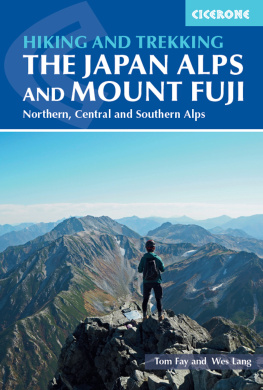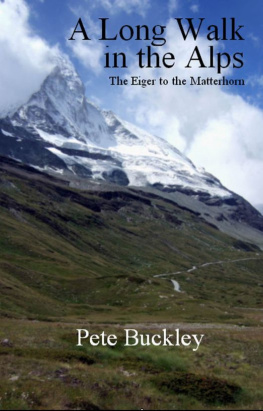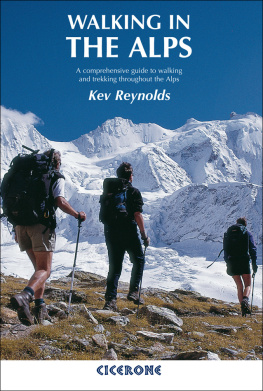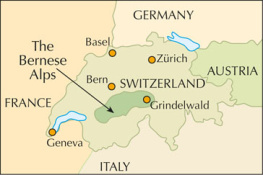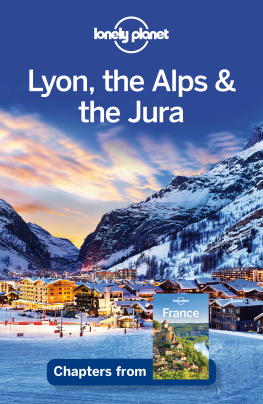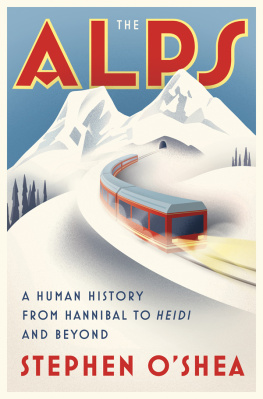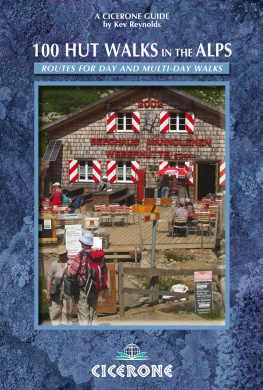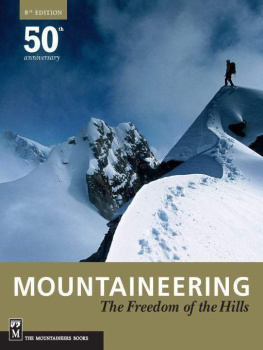The Alps
Ronald Clark

This electronic edition published in 2011 by Bloomsbury Reader
Bloomsbury Reader is a division of Bloomsbury Publishing Plc, 50 Bedford Square, London WC1B 3DP
Copyright 1973 Ronald W. Clark
The Moral rights of this author have been asserted.
All rights reserved. No part of this publication may
be reproduced, stored in or introduced into a
retrieval system, or transmitted, in any form, or by
any means (electronic, mechanical, photocopying,
recording or otherwise) without the prior
written permission of the publishers. Any person who does
any unauthorized act in relation to this publication
may be liable to criminal prosecution and civil
claims for damages.
ISBN: 9781448206582
eISBN: 9781448206223
Visit www.bloomsburyreader.com to find out more about our authors and their books
You will find extracts, author interviews, author events and you can sign up for
newsletters to be the first to hear about our latest releases and special offers
We love Nature, it is true, but put into vases, into cages, into aquaria. It goes without saying that we agree with the commission for the protection of special sites, but only when it protects vague areas; we are all members of the Society for Nature Reserves - but only on condition that the existence of these reserves inconveniences neither fishermen nor hunters, neither foresters nor walkers, neither you nor I.
Professor Charles Baehni,
Revue de la Ligue pour la Protection de la Nature,
June 1962, N0.3.
There is a slope in the Graian Alps, somewhere above the back end of the Valgrisanche, long if not particularly steep, below the permanent snowline and burrowed with holes from which the marmots whistle at each other like a ventriloquists chorus. It goes on interminably, and you begin to doubt the wisdom of walking uphill at all. But you know you are high; with each breath you know you are higher, and it is only a minor feat of imagination to believe you are higher than anything else in Italy or Europe or even the world. Then you stop and look round. Then you look up. At least you feel you look up, which is what matters psychologically. What you gain, from an almost impossible thirty miles away, is an overwhelming impression of rock and rib, ice and arte and snowfieldthe huge south face of Mont Blanc, as far away as a good man could walk in a day but hanging high in the sky like a medieval painters dream.
The involuntary gasp of surprise is one expression of the long contemplative enjoyment of fine sights that has been part of the Alpine reward since men first began to take mountains seriously. More than four centuries ago Conrad Gesner, the Zurich natural scientist, wrote to a friend that he had decided to climb at least one mountain a year so that he could contemplate the great spectacles of this earthly paradise, among which he rated highly the steep and broken mountain tops, the unscalable precipices, the vast slopes stretching towards the sky, the dark and shady forests. Gesner relished his views. So did his successors, the interested and interesting company of men and women who were drawn to the Alps while others still shuddered at the thought of them. Scientists like de Saussure and Agassiz came with their instruments and stayed with their passions. Ruskin caught his first sight of the Glarus Alps from above the Falls of Schaffhausen and after that was unable to escape a love-hate relationship with the great cathedrals of the earth, with their gates of rock, pavements of clouds, choirs of stream and stone, altars of snow, and vaults of purple traversed by the continual stars - the Alps which either fear or other failing caused him to worship only from below.
Ruskins successors, the mountaineers of the Golden Age, visited the Alps to exercise their physical powers of endurance and their intellectual powers of leadership. But from Wills onwards the best of them had as good an eye for a view as the eighteenth century had for landscape layout. Frederic Harrison wrote in the early 1900s of his first sight of the Alps as one of the turning points in my life, the beginning of that passion which has beset me now for fifty-six years. Mr Cooks tourists, ooh-ing and ah-ing at the Jungfrau behind its foreground of Interlaken hotels, also loved the view, if Cynara-like, in their own fashion. Today it still keeps the packaged-tour industry in fine fettle.
It is difficult to analyse the factors which transform a mountain scene, of which the Alps have hundreds of thousands, into a great view of which they have tens of thousands. Unexpectedness is one of them, as in Hilaire Bellocs revelation of the mountains from the Weissenstein, the sight in the sky that made me stop breathing, just as great danger at sea, or great surprise in love, or a great deliverance will make a man stop breathing. Driving up the northern flank of the Weissenstein today, more than half a century after Belloc walked his way to Rome, you find few essentials changed. You crest the ridge and come on to one of the grandstand balconies that the Jura provides between the Col de la Faucille behind Geneva and the Wisenberg above Olten. If you are lucky you see the Alps as Belloc saw them above Switzerlands plain, sky beneath them and sky above them, almost sixty miles away, pin-sharp and visions from another world.
Unexpectedness makes a view stick in the memory, so that a quarter of a century later you see, clear as a picture on the study wall, the long frieze of Dauphin summits that, approached from the north, appear one by one above the horizontal skyline dividing the Maurienne and Romanche valleys; peaks of a setpiece transformation scene rising above green waves as you breast the col. Contrariwise the expected show-sights take longer to recall; but their images harden as recollection pulls up the detail like developer working on a print. The Oberland from the Terrace at Bern; the Alps from Nyon, a horizontal display sectioned above the Lake of Geneva like a folding panorama in a pre-war Baedeker, a thin slice of country going on and on as though God had forgotten to stop making mountains; the postcard Wetterhorn and Matterhorn, each standing above its respective foreground as though a celestial photographer had put them in to produce the accepted format; all are, in capitals, views worth seeing. Certainly they have become weather-worn with repetitive description, certainly they can be savoured with the expenditure of little cash and less energy; yet they have survived the sieve of many generations and they have done so because they genuinely have the splendid quality of great scenery.
But effort counts as well as accessibility, and an argument could be made for the greatest views of the Alps being those which demand at least a modicum of puff and blow. As Arnold Lunn said in Mountains of Memory - and not only, one feels, to start an argument: How frequently the reward of beauty is associated with the dignity of toil, as if nature consciously reserves her noblest effects for those who take some trouble to earn them. Effort alone provides what Sir Claud Schuster called the moment of ecstasy when your head reached the level of the arte, and all the glorious spires and domes, ramparts and battlements leap into view at once. You gasp at them, he went on, partly from admiration and partly from lack of breath, and then let your eye look down at the mighty ice-basin below and the long cool stream of the Aletsch, the treasure-house of the frost. A particular revelation creeps into the view which has been reached on ones own two feet - even if panting hard and praying that the top does not lie beyond that next little ridge, a whole ten paces away. This may be unfair on the fat, the elderly and the infirm but, as Bertrand Russell has pointed out, one must at some point admit that most of life is unfair. And just as there is an immutable law in physics which ordains that every action provokes its own equal reaction, so does the way in which you reach a view control the intensity and understanding and delight; easy come, less delight, a law of scenery as inescapable as the swings and roundabouts of more mundane affairs.


